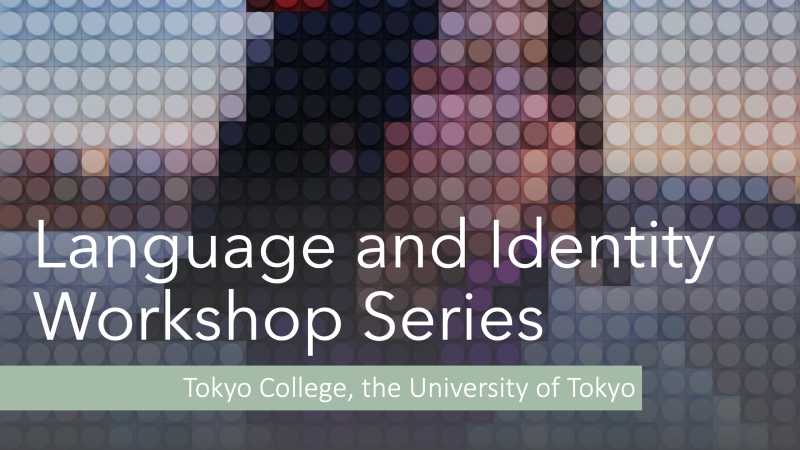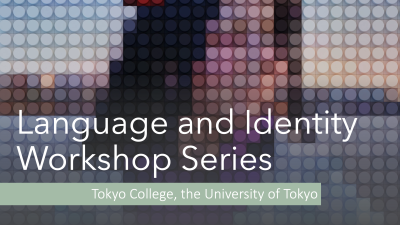Language and Identity Workshop II. Language in Media: Representation and Consumption

| Date(s) | Wednesday, 1 March 2023, 16:00-17:30 |
|---|---|
| Venue |
Zoom Meeting (Register) |
| Registration | Pre-registration required |
| Language | English |
| Abstract |
Gad Hai GERSHONI (Ph.D. Candidate, Nagoya University) Media, Keywords, and Discourses: The New Words and Buzzwords Award’s Influence on Social Discourse in Japan Since 1984, every December, the publication house Jiyūkokuminsha’s committee announces, in a popular ceremony, the year’s winning words in the Shingo Ryūkōgo Taishō (the new words and buzzwords award). The award, which receives great media and public attention, is recognized as a significant institution reflecting Japan’s most important cultural trends and issues. However, this study argues that the award does not passively reflect contemporary society. Instead, it is a significant institution in Japanese society with the potential to influence social discourses from a power position. After discussing the award’s social significance, the paper applies Foucault’s discourse and power/knowledge theories (Foucault 1975; 1982) and the notion of ‘keywords’ (Wierzbicka 1997; Williams 2014) to the award’s potential influence on social discourses, specifically regarding gender equality and identity. This study argues that the extensive media coverage makes the award a prestigious institution and that its yearly words selection establishes significant keywords. Thus, the award discerns for Japanese society which issues or trends (signified by the keywords) are most important – an act both synchronizing and stirring social discourse. Furthermore, by analyzing all the award’s selections qualitatively, the study finds that since 2014 the award’s committee began using the award’s selections to make normative claims and criticize government policies – most notably regarding gender equality and identity. Hence, this paper aims to draw attention to the overlooked social significance of the Shingo Ryūkōgo Taishō in Japan and contributes to a better understanding of the relationships among keywords, media, social discourse, and public perception of specific issues. References: Foucault, Michel. 1975. Discipline and Punish: The Birth of the Prison. Vintage. ———. 1982. “The Subject and Power.” Critical Inquiry 8 (4): 777–95. Wierzbicka, Anna. 1997. Understanding Cultures through Their Key Words: English, Russian, Polish, German, and Japanese. Vol. 8. Oxford University Press on Demand. Williams, Raymond. 2014. Keywords: A Vocabulary of Culture and Society. Oxford University Press.
WEN Qiuying (Ph.D. Student, Kyoto University) Chinese-language voices in media: An otherness in comparison to Kundoku This talk will explore the various representations of the Chinese language as an “other” in Japanese media of the 1930s, specifically, print texts and radio. The launch of the Chinese-language learning program Shinago Kōza in 1931 by the Japan Broadcasting Corporation increased public exposure to spoken Chinese. At the same time, cultural identity and perceptions of spoken Chinese emerged, particularly compared to Kundoku, the practice of reading written Chinese in Japanese syntax. The talk will first discuss the dual nature of spoken Chinese as both an audible form on the radio and a changing text space in print media. Magazines intended to teach Chinese used various pronunciation symbols to accurately record spoken Chinese, including symbols designed to standardize spoken language. Next, the complexity of the otherness of China in the radio program Shinago Kōza will be discussed. Although Chinese voices were always presented as speaking a foreign language distinct from Kundoku, that otherness was complicated during wartime. Being seen as a friendly and affiliated language, Shinago was in an ideological grey zone between the “enemy” and “our” language, while retaining its status as a language of the other.
Callum Hew SARRACINO (Ph.D. Candidate, Sheffield University & Tohoku University) The ‘Appropriate’ Language for Queerness: A Case Study of Kyoto Animation Amidst an LGBT Boom in the Japanese media over the last decade, queer identities have seen a greater focus in the media and politics, and with it debates over what representations are ‘appropriate’ for wider public consumption. While media that focuses explicitly on queer lives has grown alongside this boom, its effect can also be observed in series that are not explicitly about queerness. This paper presents a case study of major anime studio Kyoto Animation, their adaptation of Free! (2013-2022), a series about competitive swimming, and the role of language in both representing and obfuscating queerness within. Drawing on Stuart Hall and his colleagues’ Circuit of Culture model, which theorises cultural production as the result of the interaction between production, regulation, representation, identity, and consumption, I argue that Free! is designed to pass both as completely cisheteronormative and extremely queer simultaneously. Based on my analysis of published interviews with Kyoto Animation creators, I then suggest that both readings are designed to be understood as valid, with neither overwhelmingly privileged in the narrative itself. The prominence of queerness instead depends heavily on the relationship between the consumer and the frameworks of knowledge they use to understand the language in the series. Queerness is a central part of the Japanese media and is consistently catered to within media works, but only so much as is ‘appropriate,’ never leaving it as the only unambiguous reading of a series.
YANG Liu (Ph.D. Candidate, University of Tsukuba) How does Voice Construct Identity? An Analysis on Japanese Voice Actors Based on a Theoretical Model Sociolinguists have pointed out that identities can be expressed through language. Most of their research focus on lexical and grammatical resources, leaving the auditory aspect of language use untouched. This research aims to propose a model on how semiotic resources help construct identities from a linguistic anthropological perspective, taking not only the linguistic aspect, but also the auditory aspect of language use into consideration. The research consists of two parts. First, I propose a theoretic model on identity construction through language. My argument is that language use may potentially index the speaker and/or the context, thus dynamically creating identities. The model mainly lays its foundations on and expands the theories on pragmatically produced kyara, a Japanized English loanword referring to personalities (Sadanobu 2020). It also aligns with the pragmatics of wakimae (“discerning”, Ide 2006), which argues that speakers of particular languages and cultures obligately speak and behave according to the situations where they are, rather than on behalf of their own intentions. Second, I examine whether this model applies to auditory resources, such as voice. By analyzing video records on Japanese voice actors performing fictional characters, I examine how voice, technically disembodied from the voice actor, refers to the fictional character in symbolic, iconic and indexical ways. In such a way, the voice actors construct their identities as performers, along with the virtual identities of their characters. In conclusion, I argue that in addition to linguistic signs, voice itself can also function as semiotic resources in the construction of identities. References:
For information about the keynote lecture for this event, please see this event page. To learn more about the Language and Identity Workshop Series, check out this news article. |
| Program |
16:00-16:20 (15 min. talk + 5 min. Q&A)
16:20-16:40 (15 min. talk + 5 min. Q&A)
16:40-17:00 (15 min. talk + 5 min. Q&A)
17:00-17:20 (15 min. talk + 5 min. Q&A)
17:20-17:30 |
| Speaker Profile |
Presenters Gad Hai GERSHONI
WEN Qiuying
Callum Hew SARRACINO
YANG Liu
Moderator Hannah DAHLBERG-DODD |
| Organized by | Tokyo College, The University of Tokyo |
| Contact | tokyo.college.event@tc.u-tokyo.ac.jp |















